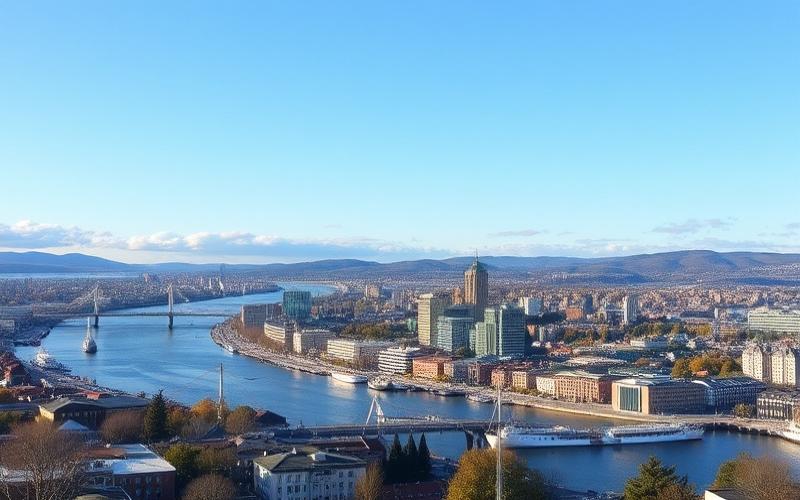
 Published on and written by Cyril Jarnias
Published on and written by Cyril Jarnias
Relocating to Norway is attracting growing interest among those seeking a unique and enriching experience amidst spectacular landscapes and a society that is both modern and respectful of nature.
This Scandinavian country, renowned for its exceptional quality of life, offers numerous advantages such as an efficient healthcare system, an enviable work-life balance, and a strong culture of equality.
However, settling in Norway is not without its challenges. It’s essential to consider certain potential drawbacks, like the high cost of living and harsh climate.
In this article, we will explore these different aspects in detail to help you assess whether Norway is the ideal expatriation destination for you.
The Economic Benefits of Living in Norway
Living in Norway offers considerable economic benefits, based on the stability, prosperity, and efficiency of the Scandinavian social model.
- High Standard of Living and Stable Economy
Norway ranks among the world’s wealthiest countries per capita, thanks to a robust economy driven by its natural resources, primarily oil, but also hydroelectric power, fisheries, and forestry resources. This natural wealth ensures a high standard of living and great economic stability, even during global crises, with the country experiencing one of Europe’s mildest recessions in 2020. - Purchasing Power and Competitive Salaries
Residents benefit from high purchasing power, supported by some of Europe’s most competitive wages. GDP per capita exceeds $99,000 USD, with regular salary increases guided by sectoral agreements. Despite a high cost of living, the level of compensation and productivity maintains financial comfort above the European average. - Generous Social Benefits
The Norwegian model includes highly developed social benefits:
- Substantial paid leave for all employees
- Extensive family allowances to support families
- Universal healthcare system, state-funded, accessible to the entire population
This social safety net helps reduce inequalities and ensures a consistent quality of life.
- Progressive Tax System and Tax Benefits
Norwegian taxation is progressive, with a high tax rate, but it directly funds collective welfare: education, healthcare, infrastructure, social assistance. The most vulnerable households benefit from tax reductions and specific allowances, mitigating the effects of inflation or temporary economic difficulties. - Employment Opportunities in Dynamic Sectors
Norway offers numerous prospects in growing sectors:
- Technology and digital innovation
- Finance and banking services
- Renewable energy and green transition
The job market is dynamic, with a historically low unemployment rate and a need for skilled labor, particularly in technical professions.
- Investment in Education and Continuing Training
The country invests heavily in higher education and vocational training, promoting employability and career advancement. Over 30% of the population holds a higher education degree.
This support for training creates an environment conducive to innovation and skill development.
| Economic Benefits | Summary Explanations |
|---|---|
| High Standard of Living | Oil wealth, macroeconomic stability |
| Purchasing Power and Salaries | Among the highest wages in Europe |
| Social Benefits | Leave, allowances, universal healthcare |
| Taxation and Redistribution | Progressive system, targeted aid |
| Employment in Dynamic Sectors | Technology, energy, finance, green transition |
| Education and Continuing Training | Strong public investment, high qualification level |
Choosing to live in Norway means benefiting from a robust economic framework, high-level social protection, and a stimulating professional environment, driven by a policy of investment in welfare and human development.
These advantages translate into financial security, attractive career prospects, and a globally recognized quality of life.
Good to Know:
Living in Norway offers a high standard of living thanks to a stable economy and competitive wages, while the progressive tax system and generous social benefits support a secure living environment. Additionally, employment opportunities in growing sectors and investments in education enhance professional development.
The Cultural Challenges to Overcome in Norway
Expatriates in Norway face several major cultural challenges, including adapting to local social norms, understanding the Norwegian way of life, and communication differences.
Main Cultural Challenges:
Adapting to Local Social Norms
- Norwegians value discretion, modesty, and respect for privacy. Exuberance and spontaneity are often perceived negatively.
- There are many implicit rules of etiquette: don’t interrupt, avoid overly expressive displays, respect personal space.
- An expatriate testifies:
“Here you have to keep your head high in all circumstances. Exuberance and spontaneity are not necessarily seen as positive.”
Understanding the Norwegian Way of Life
- The pace of life is marked by a balance between work and personal life. Work hours are generally fixed, and free time is sacred.
- Norwegians prioritize outdoor activities and place great importance on nature.
- Norwegian society is influenced by Protestant principles of discipline and restraint.
Communication Differences
- Norwegian communication is often direct but not very demonstrative. Unspoken words are common, and transparency is valued.
- Consensus plays a central role in decision-making, both in the workplace and in daily life.
- Hierarchical relationships are horizontal: the manager is more of a facilitator than an authoritarian boss.
Table: Differences in the Norwegian Work Environment
| Aspect | Norway | Latin Countries (e.g., France) |
|---|---|---|
| Hierarchy | Flat, not very marked | Strong, often vertical |
| Decision | Consensus, dialogue | Manager’s decision |
| Communication | Direct, not very emotional | Often indirect, expressive |
| Work-Life Balance | Priority | Often sacrificed |
Language Barrier and Learning Norwegian
- Although English is commonly spoken, mastering Norwegian is essential for full integration.
- Regional dialects, idiomatic expressions, and complex grammar pose obstacles.
- Learning Norwegian facilitates access to employment, administrative procedures, and building social connections.
- Expatriates who speak Norwegian are better perceived and integrated into society.
- Testimony:
“The blocking by Norwegians regarding language. I had many Norwegian ‘buddies’ but never ‘friends’… once in a group, the language barrier appeared.”
Integration into Norwegian Social Circles
- Norwegians are known for being reserved, and integration into local social circles can take several years.
- There is a certain impermeability in the Norwegian social network, often felt as a ‘culture gap’.
- An expatriate shares:
“It’s been 5 years since I’ve been here and my neighbors still don’t talk to me… Unfortunately, we have no Norwegian friends!”
List of Strategies to Facilitate Integration:
- Learn Norwegian and participate in conversation groups.
- Join association activities and local clubs.
- Get involved in cultural and sporting events.
- Respect social norms and local communication codes.
- Accept the slowness of integration processes and persevere.
Note: Integration challenges vary by region (easier in cosmopolitan big cities, more difficult in rural areas) and by the expatriate’s origin (visible minorities may encounter additional obstacles).
“Decoding Norwegians’ emotions has always been difficult and I often questioned myself. I make friends easily elsewhere, but Norwegians have always been a puzzle for me.”
Cultural immersion and open-mindedness are therefore essential for a successful expatriation in Norway.
Good to Know:
Adapting to Norwegian social norms, like punctuality and discretion, can be a challenge, as can understanding a communication style that is often indirect and consensus-oriented; learning the local language greatly facilitates integration, even though English is commonly spoken.
The Personal Impact of an Expatriation to Norway
Emotional Challenges During Integration into a New Culture
- Difficulty Making Norwegian Friends: Norwegian society is recognized as one of the world’s most difficult for social integration. Expatriates highlight the difficulty of forming deep bonds with locals, often limited to superficial or utilitarian relationships. This can lead to feelings of isolation and personal questioning, even after several years in the country.
- Culture Shock and Misunderstanding of Social Codes: Norwegian behaviors, marked by restraint, discretion, and a certain distance, strongly contrast with more extroverted cultures. Some expatriates mention the frustration of not decoding emotions or facing a form of perceived moral superiority among Norwegians.
- Loneliness and Weariness: After the excitement of the first months, loneliness sets in for some, aggravated by the climate, long winters, and lack of natural light, potentially leading to psychological discouragement.
Personal Learnings and Adaptation
- Learning to adapt to a new lifestyle involves stepping out of your comfort zone, questioning your own habits, and adopting new social codes. Adaptation often comes through language learning, participation in local activities (sports, hobbies), and patience with integration.
- The need to develop resilience, autonomy, and an ability to appreciate solitude are frequently cited. Some expatriates mention a realization about their own values and priorities, the discovery of a different relationship with time and nature, and a greater capacity for introspection.
Influence of Norwegian Culture on Well-being and Personal Development
| Positive Influence | Negative Influence |
|---|---|
| Quality of the social system | Social isolation |
| Security and tranquility | Difficulty integrating |
| Respect for nature | Rigidity of social norms |
| Generous parental leave | Long and dark winters |
The Norwegian social model, focused on equality, trust, and security, promotes a sense of stability and material well-being.
The importance given to environmental respect and a healthy lifestyle positively influences expatriates’ habits.
However, the pressure to conform and the difficulty in expressing emotions can be sources of discomfort.
Potential Benefits in Terms of Quality of Life
- Access to a high-performing healthcare and education system.
- Daily security: low crime rate, peaceful atmosphere.
- Tranquility and proximity to nature, allowing for better physical and mental quality of life.
- Advantageous family policies (parental leave, parenting support).
Challenges Related to Distance from Friends and Family
Feelings of longing and nostalgia, reinforced during difficult times or family events.
Increased need for psychological support or expatriate communities, particularly French-speaking ones, to compensate for emotional distance.
Expatriate Testimonials
“Norway is my 3rd expatriation country, the one where I’ve stayed the longest, and yet the one that is the furthest from my personality.”
“The impermeability of the Norwegian social network is making me leave. It’s been 5 years since I’ve been here and my neighbors still don’t talk to me… This has contributed to painful social isolation.”
“We were lucky to enjoy our maternity and paternity leave and to enjoy our 3 children.”
“I was very apprehensive about the long winters and lack of light. After so many years in Scandinavia I confirm that it has become an ordeal, especially in recent years. At first it’s quaint, you discover, but after a while life is still hard in that regard!”
How the Experience Shapes Identity and Perspectives
Some expatriates affirm that their stay in Norway allowed them to know themselves better, appreciate calm, nature, and simplicity, while becoming aware of the importance of their original cultural identity.
This experience, although sometimes difficult, constitutes a true revealer of their own needs, expectations, and limits, strengthening their adaptability and open-mindedness.
Visual Summary of Main Impacts
| Aspects | Effects |
|---|---|
| Emotional Challenges | Isolation, self-questioning |
| Personal Learnings | Resilience, autonomy |
| Cultural Influence | Material well-being, but social rigidity |
| Quality of Life | Security, nature, family |
| Distance from Loved Ones | Nostalgia, need for support |
Good to Know:
Living in Norway can transform your perspective through work-life balance, but prepare for emotional challenges related to family distance and cultural adaptation; however, expatriates testify to personal enrichment and a better quality of life.
Disclaimer: The information provided on this website is for informational purposes only and does not constitute financial, legal, or professional advice. We encourage you to consult qualified experts before making any investment, real estate, or expatriation decisions. Although we strive to maintain up-to-date and accurate information, we do not guarantee the completeness, accuracy, or timeliness of the proposed content. As investment and expatriation involve risks, we disclaim any liability for potential losses or damages arising from the use of this site. Your use of this site confirms your acceptance of these terms and your understanding of the associated risks.























